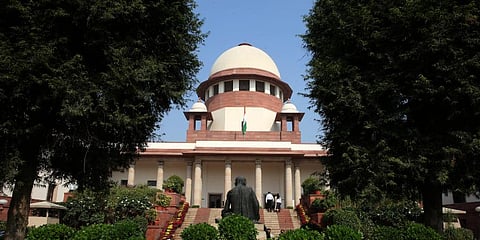

NEW DELHI: The Supreme Court on Wednesday said that it is the sacrosanct duty of the husband to provide financial support to the wife and minor children even by earning through physical labour if he is able-bodied, except on the legally permissible grounds under the law.
The top court said Section 125 of CrPC was conceived to ameliorate the agony, anguish and financial suffering of a woman who is required to leave the matrimonial home so that some suitable arrangements could be made to enable her to sustain herself and the children.
A bench of justices Dinesh Maheshwari and Bela M Trivedi made the observations while directing an "errant" husband, who had questioned the chastity of his estranged wife and had sought a DNA test of their son, to pay maintenance of Rs 10,000 per month to her, over and above the maintenance allowance of Rs 6,000 granted by the family court for the child.
"It is the sacrosanct duty of the husband to provide financial support to the wife and minor children. The husband is required to earn money even by physical labour, if he is able-bodied, and could not avoid his obligation, except on the legally permissible grounds mentioned in the statute", the bench said.
The bench allowed the appeal of the wife against the high court order, which had upheld the family court order dismissing her plea for grant of maintenance but had allowed the financial support for her minor son.
"The respondent (husband) being able-bodied, he is obliged to earn by legitimate means and maintain his wife and the minor child. Having regard to the evidence of the appellant-wife before the Family Court, and having regard to the other evidence on record, the court has no hesitation in holding that though the respondent had a sufficient source of income and was able-bodied, had failed and neglected to maintain the appellants", it said.
It rejected the submission of the husband made through his advocate Dushyant Parashar that he has no source of income as his business has now been closed and the wife has moved out of the matrimonial home on her own.
It added that the Family Court, in the instant case, had not only overlooked and disregarded the settled legal position but had proceeded with the proceedings in an absolutely "pervert manner".
"The very fact that the right of the respondent (husband) to cross-examine the witnesses of the appellant-original applicant (wife) was closed, as he had failed to appear before the Family Court despite the issuance of warrants, clearly established that he had no regards for his own family nor had any regards for the court or the law", it said.
The top court said that the allegations made by the wife in her evidence before the court had remained unchallenged and, therefore, there was no reason for the Family Court to disbelieve her version, and to believe the oral submissions made by the counsel appearing for the husband, which had no basis.
"In absence of any evidence on record adduced by the respondent disputing the evidence adduced by the appellant, the Family Court could not have passed the order believing the oral submissions of the counsel for the respondent", it said.
The top court stated that the wife had clearly said how she was harassed and subjected to cruelty by her husband that had constrained her to leave the matrimonial home along with her children and as to how he had failed and neglected to maintain her and her children.
"She had also proved by producing documentary evidence that her father had paid money to the respondent from time to time to help the respondent for his business", it said.
The bench said that the "errant respondent had also gone to the extent of questioning her chastity" alleging that his minor kid was not his biological son.
"There was nothing on record to substantiate such baseless allegations. His application for a DNA test was also rejected by the Family Court. Of course, the Family Court granted the Maintenance petition so far as the appellant no. 2-son was concerned, nonetheless had thoroughly misdirected itself by not granting the maintenance to the appellant-wife", it added.
Referring to the order of the Family Court in the instant case, the bench said that such an "erroneous and perverse order" was unfortunately confirmed by the High Court by passing a "very perfunctory" impugned order."
The High Court, without assigning any reasons, passed the impugned order in a very casual manner.
"This court would have remanded the matter back to the High Court for considering it afresh, however considering the fact that the matter has been pending before this court for the last four years, and remanding it back would further delay the proceedings, this Court deemed it proper to pass this order", it said.
The couple got married on December 7, 1991 and have two children- a daughter (now major) and a minor son.
The wife had filed a plea in the trial court that she was subjected to cruelty and physical and mental torture, as a result, she had to leave her matrimonial home.
It was also alleged by the wife that there were dowry demands of Rs 1 crore from her father and even her husband questioned her chastity.
The husband had denied the allegations about the dowry demand and harassment and according to him, she had left her matrimonial home along with children without any reason. He had claimed that the minor son was not his biological son.